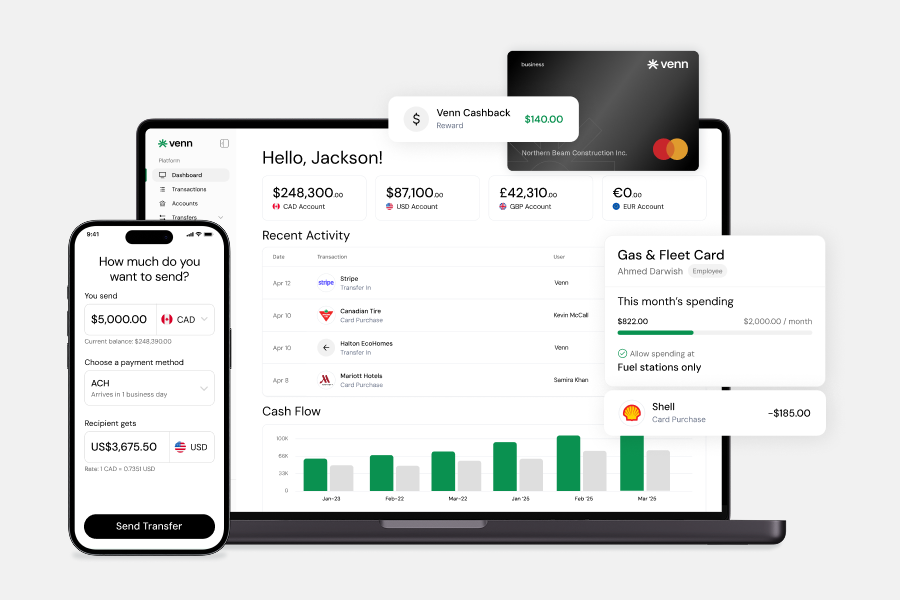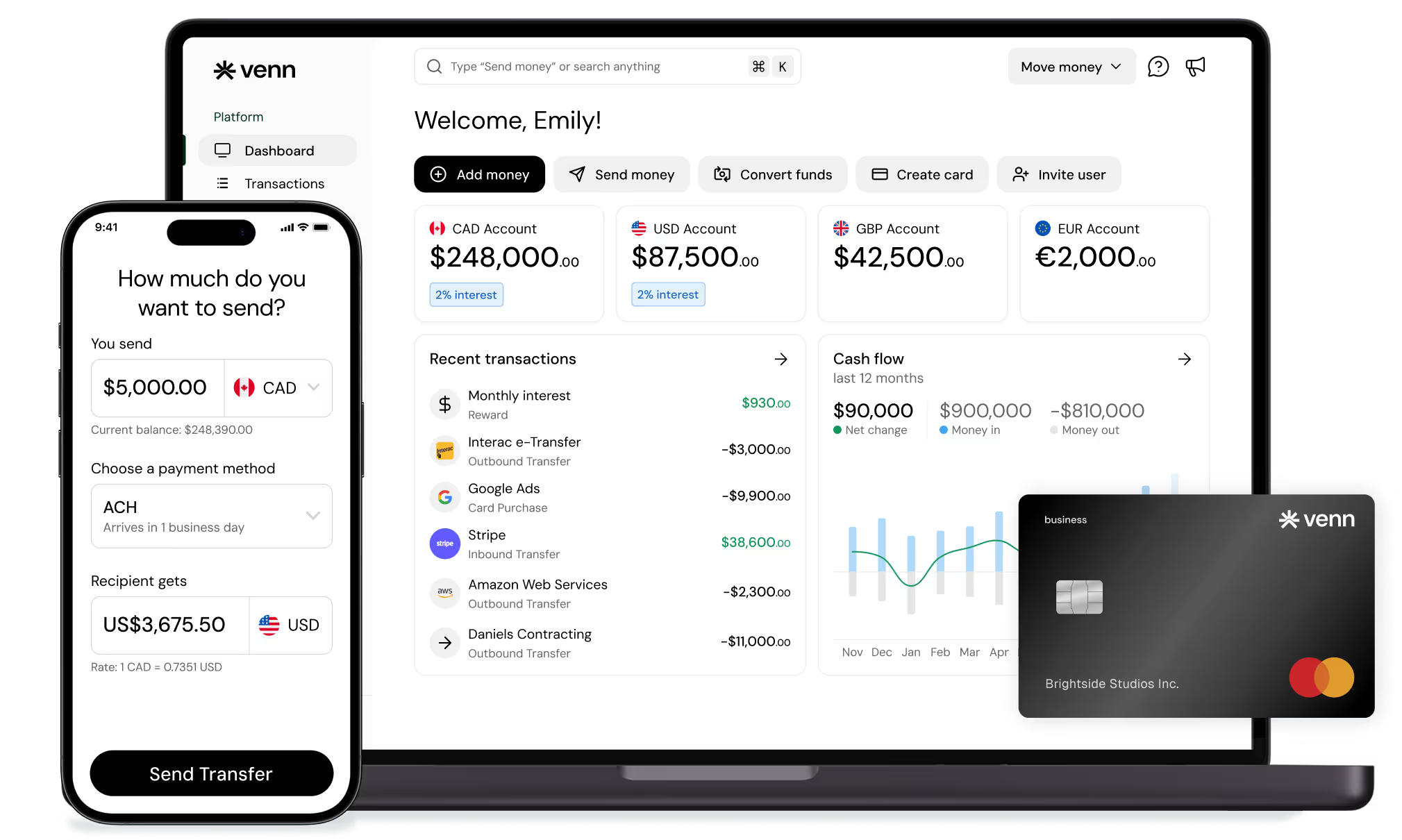Can Two Businesses Have the Same Name in Canada?
In Canada, two businesses can legally share the same name in some cases. But overlapping names often lead to confusion with payments, invoices, and trademarks. Here’s how to avoid it.


Trusted by 5,000+ Canadian businesses
Business banking for Canada
Local CAD and USD accounts, corporate cards with cashback, the lowest FX rates in Canada, free local transfers, and more.
Naming your business feels exciting, but it is also a legal box you need to tick. The name you choose affects how customers find you, how vendors send payments, and whether your invoices get questioned.
Here is what you need to know about when two Canadian businesses can share the same name and how to protect yourself.
Can Two Canadian Businesses Have the Same Name?
The short answer: it depends. Two businesses in Canada can have the same or similar names, but only under certain conditions. The rules depend on:
• Where you incorporate (federal vs. provincial/territorial)
• Whether the name is trademarked
• Whether the name is considered “confusingly similar” to an existing one
This is why checking name availability is one of the first steps before incorporation or trademark registration.
Federal vs. Provincial Name Registration
Federal Incorporation (Canada Business Corporations Act)
If you incorporate federally, your business name is reviewed across all of Canada. Corporations Canada will reject a name that is identical or too similar to an existing federally incorporated business.
Provincial Incorporation
Each province has its own corporate registry. A business incorporated in Ontario could have the same name as one in Alberta because the registries don't cross-check each other automatically.
For businesses targeting customers across Canada, this creates risks. Two companies with the same name in different provinces can cause confusion for clients, vendors, or accountants managing payments and invoicing.
Federal vs. Provincial Incorporation: How to Decide
Choosing between federal and provincial incorporation is not only a branding decision, it directly impacts compliance and operations.
When federal incorporation makes sense:
• You plan to do business across multiple provinces.
• You want broader protection of your business name across Canada.
• You are building a brand that you expect to scale nationally.
When provincial incorporation makes sense:
• Your operations are mainly local (for example, a construction company that only works in Ontario).
• You want to keep upfront costs lower (provincial fees are often less than federal plus extra-provincial registration).
• You want faster approval, since some provinces allow name approval with fewer checks.
If you expect to remain in one province, provincial incorporation is usually enough. If your brand or customer base will cross borders, federal plus extra-provincial registration gives you more protection and fewer conflicts down the line.
Trademarks: Stronger Than Incorporation
Even if a name is available for incorporation, it may still be protected as a registered trademark.
- Registered trademarks grant exclusive rights across Canada for specific goods or services.
- If your chosen name conflicts with a trademark, you could face legal action even if your provincial registry allowed it.
You can search trademarks through the Canadian Intellectual Property Office (CIPO) database to check.
Risks of Sharing a Name
Sharing a name with another business can slow you down. Beyond the legal risks, it can create payment delays, invoice disputes, and accounting headaches.
- Payment delays: Clients or vendors may send EFTs, ACH, or Interac e-Transfers to the wrong company.
- Invoice disputes: Without clear branding, invoices could be challenged or rejected.
- FX transfers: For SMBs working cross-border, holding multi-currency accounts with the same business name as another company could complicate compliance checks.
- Tax registration: The CRA requires a unique identifier (business number), but confusion at the naming level can still lead to errors when registering for GST/HST.
How to Protect Your Business Name
1. Conduct a NUANS Search
A Newly Upgraded Automated Name Search (NUANS) report is required for federal incorporation and in some provinces. It shows existing business names and trademarks that may conflict.
2. Register a Trademark
If your name is a core part of your brand, trademark registration gives the strongest protection. This prevents other businesses in Canada from using it in a way that confuses customers.
3. Monitor for Similar Names
Even with incorporation and trademark protection, monitoring is key. Some SMBs set up alerts or work with accountants and lawyers to watch for new filings.
4. Use Clear Branding in Financial Operations
- Include your corporation number on invoices.
- Use Venn invoicing to minimize payment errors and keep a consistent, professional look.
- Use multi-currency accounts to separate CAD, USD, and other currency payments clearly.
- Automate payments with approval workflows to reduce disputes.
Practical Examples
1. Same name, different province: An Ontario construction company and an Alberta construction company could both operate under “Maple Builders Ltd.”, unless one trademarked the name.
2. Same name, different industry: “Blue Sky Marketing Inc.” and “Blue Sky Plumbing Inc.” may both exist, as long as customers are unlikely to confuse them.
3. Same name, trademark conflict: A local clothing shop called “Roots Apparel” would face legal challenges from Roots Canada, even if the provincial registry allowed the incorporation.
Can Two Sole Proprietors Use the Same Name?
Sole proprietorships are registered differently, and their name protection is limited. That is one reason many founders choose to incorporate early — to secure stronger rights to their name.
So, can two businesses have the same name in Canada? Technically yes, but it’s rarely a good idea. For SMBs, the cost of confusion often outweighs the convenience of keeping a name that isn’t fully protected.
If you’re managing finance for a Canadian SMB, safeguard your operations by checking availability, registering trademarks, and setting up workflows that minimize errors.
Tools like Venn’s invoicing, payments, and FX transfers make it easier to run compliance-ready, error-free financial operations. Try it out today!

Frequently Asked Questions (FAQ)
🆔 Refined FAQs: Corporate Naming and Identity
Here are the 3 refined FAQs covering Canadian corporate naming and identification:
Q: Is a numbered company name unique across Canada?
Yes. When you incorporate a numbered company, the federal or provincial registry assigns a unique identification number that is exclusive to your corporation within that jurisdiction. This number, combined with the legal designation (e.g., "1234567 Canada Inc."), serves as your unique legal corporate name. However, if you later choose to operate under a separate descriptive trade name for marketing purposes, that trade name is not automatically protected from conflicting with other registered business names or trademarks.
Q: If my business has the same name as another, will that affect my CRA tax accounts?
No. The Canada Revenue Agency (CRA) primarily uses your Business Number (BN)—a unique, 9-digit identifier—to track your corporate tax accounts (RC), payroll accounts (RP), and GST/HST accounts (RT). The legal or trade name is secondary for identification purposes. As long as your BN is unique to your corporation, having a similar or overlapping name with another business will not affect your tax compliance or filings with the CRA.
Q: Can I operate under a different trade name than my legal corporation name?
Yes. It is common for corporations to register a "doing business as" (DBA) name or trade name. This allows the company to establish a consumer-friendly brand (e.g., operating as "Elegant Event Planners") while maintaining a formal or numbered legal name (e.g., "1234567 Ontario Inc.") for official contracts and legal documents. Trade names must be registered at the provincial level and must still comply with local business name rules and trademark regulations.
This publication is provided for general information purposes and does not constitute legal, tax or other professional advice from Venn Software Inc or its subsidiaries and its affiliates, and it is not intended as a substitute for obtaining advice from a financial advisor or any other professional. We make no representations, warranties or guarantees, whether expressed or implied, that the content in the publication is accurate, complete or up to date.
Venn is all-in-one business banking built for Canada
From free local CAD/USD accounts and team cards to the cheapest FX and global payments—Venn gives Canadian businesses everything they need to move money smarter. Join 5,000+ businesses today.

Frequently asked questions
Everything you need to know about the product and billing.
Venn is the cheapest and easiest way to manage your business banking needs. We offer the best currency exchange rates in Canada, chequing accounts in multiple currencies, domestic and international bank transfers, and a corporate Mastercard to manage all your spend. By signing up to Venn you automatically get:
- Accounts in Canadian dollars, US dollars, British pounds, and Euros
- The cheapest FX rates in Canada with free domestic transfers (EFT, ACH, SEPA, FPS)
- A Mastercard Corporate card that gets you the same great FX rates and cashback with no minimum spend requirements
Yes, Venn holds eligible deposits at our Partner Institution in our trust accounts, including deposits in foreign currencies. CDIC protects eligible deposits up to CA$100,000 per deposit category per CDIC member institution.
No, we don’t have any hidden fees! All charges, including currency conversion and premium plans, are clear and transparent. You can even issue unlimited corporate cards to your team and sign up with a free plan in minutes! Learn more about our transparent Pricing.
Nope! Other companies and traditional bank accounts have high minimum balance requirements. This makes accounts inaccessible for small businesses or individuals. Venn does not require a minimum balance. Your CAD and USD funds will also earn 2% interest regardless of the balance.
Our process is quick — Customers typically get set up in 5 minutes or less! Create a free account and start saving with no monthly fees, cashback on card spend, and the best FX rates around.
Of course! Our friendly Support specialists are available via Chat or Email 24 hours a day, 7 days a week, 365 days a year. All tickets are monitored and responded to within 24 hours, with an average response time of 30 minutes.
Yes, we have a direct integration with QBO and Xero. We are working on more integrations very soon!
Join 5,000+ businesses banking with Venn today
Streamline your business banking and save on your spend and transfers today
No personal credit check or guarantee.


